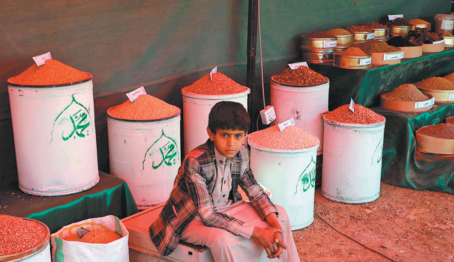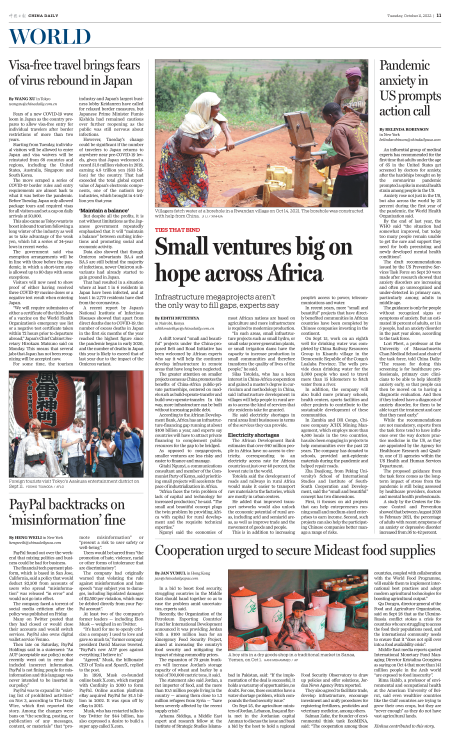
A boy sits in a dry goods shop in a traditional market in Sanaa, Yemen, on Oct 1.
In a bid to boost food security, struggling countries in the Middle East should band together so as to ease the problem amid uncertainties, experts said.
Recently, the Organization of the Petroleum Exporting Countries' Fund for International Development announced it was providing Jordan with a $100 million loan for an Emergency Food Security Project, aimed at increasing the country's food security and mitigating the impact of rising commodity prices.
The expansion of 70 grain bunkers will increase Jordan's storage capacity of wheat and barley by a total of 700,000 metric tons, it said.
The statement also said Jordan, a net importer of food, and the more than 10.5 million people living in the country — among them close to 1.3 million refugees from Syria — "have been severely affected by the recent supply crisis".
Arhama Siddiqa, a Middle East expert and research fellow at the Institute of Strategic Studies Islamabad in Pakistan, said: "If the implementation of the deal is successful, it holds a vast array of opportunities, no doubt. For one, these countries have a water shortage problem, which compounds the food security issue."
On Sept 25, the agriculture ministers of Jordan, Lebanon, Iraq and Syria met in the Jordanian capital Amman to discuss the issue and back a bid by the host to hold a regional Food Security Observatory to draw up policies and offer solutions, Jordan News Agency Petra reported.
They also agreed to facilitate trade, develop infrastructure, encourage investment and unify procedures for registering fertilizers, pesticides and veterinary medicine, among others.
Salman Zafar, the founder of environmental think tank EcoMENA, said: "The cooperation among these countries, coupled with collaboration with the World Food Programme, will enable them to implement international best practices and adopt modern agricultural technologies for boosting agricultural output."
Qu Dongyu, director-general of the Food and Agriculture Organization, said on Sept 28 that as the Ukraine-Russia conflict stokes a crisis for countries who are struggling to access the food their populations need, and the international community needs to ensure that it "does not spill over into a food availability crisis".
Middle East media reports quoted International Monetary Fund Managing Director Kristalina Georgieva as saying on Oct 4 that more than 141 million people in the Arab world "are exposed to food insecurity".
Rima Habib, a professor of environmental and occupational health at the American University of Beirut, said even wealthier countries like the Gulf countries are trying to grow their own crops, but they are "never enough" as they do not have vast agricultural lands.
Xinhua contributed to this story.
jan@chinadailyapac.com

